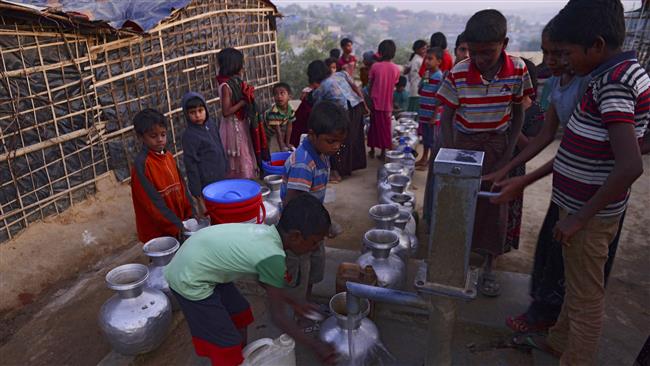
RNA - Chanting slogans and holding banners, dozens of refugees protested over the weekend their transfer to Myanmar, where they have faced a bloody crackdown by the military and extremist Buddhists.
United Nations Special Rapporteur Yanghee Lee visited a Rohingya camp in Bangladesh's coastal town of Cox's Bazar on Saturday. Lee talked with refugees and listened to their accounts of violence carried out against them allegedly by Myanmar's army.
Rohingya elders say Bangladeshi army officials have asked them to prepare lists of families from their camps for repatriation. Four of them said they were among more than 70 leaders who met army officers at Gungdum camp on Saturday.
Musa, a Rohingya refugee leader, said Bangladeshi army officials had threatened to seize their food ration cards if they did not return.
"When we said we cannot provide the lists because people are not ready to return, they asked us to bring their WP cards," said Musa, referring to relief cards provided by the UN's World Food Programme.
Rashedul Hasan, a spokesman for the Bangladeshi army, however, said he was not aware of army men threatening to take away the food cards.
Hundreds of refugees queue up at relief centers in the camps every morning to collect food using the cards. These centers are managed by the Bangladeshi army.
Caroline Gluck, a senior protection officer for the UN refugee agency, said the United Nations High Commissioner for Refugees (UNHCR) had repeatedly said the return of the Rohingya needed to be voluntary.
"UNHCR has not been part of discussions (on repatriation) to date, but has offered support to engage in the process to ensure that the voices of refugees are heard," Gluck said on Saturday, adding, “The pace of returns should be determined by the refugees themselves."
Bangladesh and Myanmar last week finalized an agreement that would facilitate the repatriation of the Rohingya refugees over the next two years.
The refugees refuse to go back unless their safety can be guaranteed and Myanmar heeds their demands for citizenship and inclusion in a list of recognized ethnic minorities.
The UN says nearly 655,000 Rohingya Muslims have fled the state of Rakhine for Bangladesh since violence intensified last August.
Since August 25, 2017, Myanmar's troops have been committing killings and rapes, making arbitrary arrests, and carrying out mass arson attacks to destroy houses in Rakhine.
Only in its first month, the military clampdown killed some 6,700 Rohingya Muslims, including more than 700 children, according to the international medical charity Doctors Without Borders.
847/940